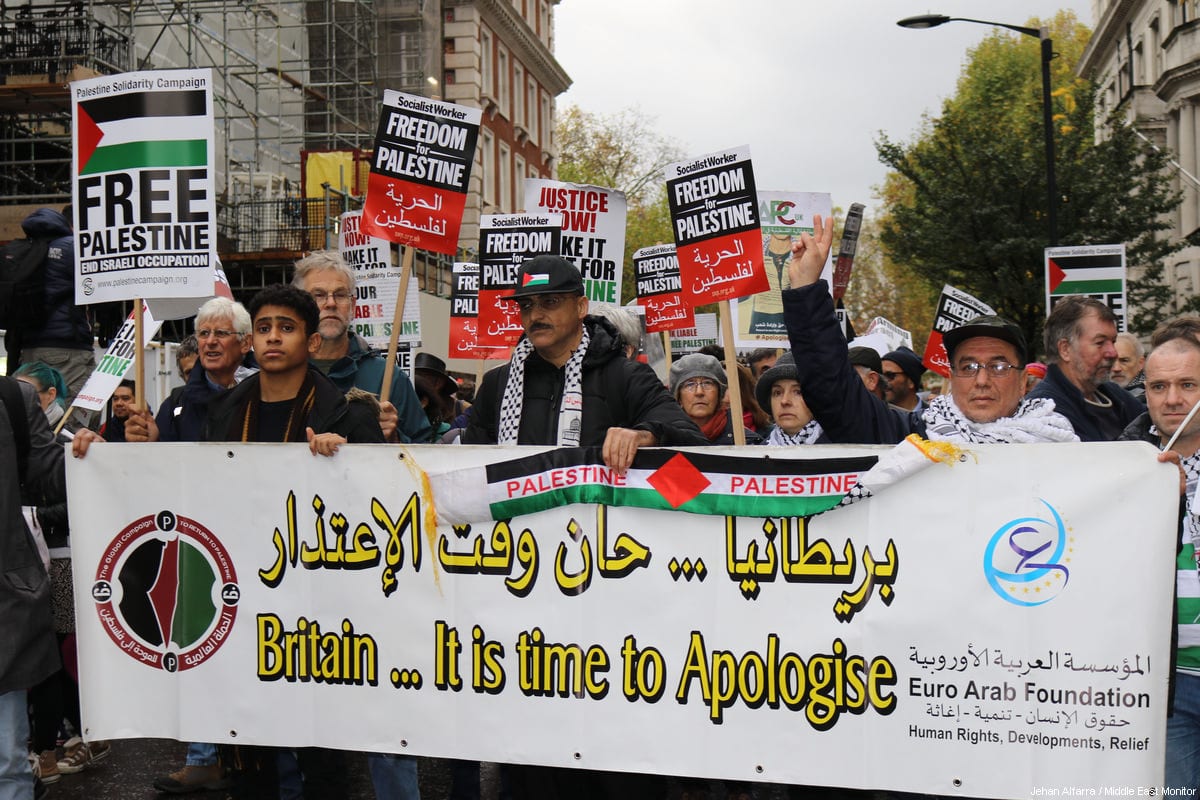
This year’s International Day of Solidarity with the Palestinian People was yet another missed opportunity for Britain. There were no messages of support or atonement from Whitehall for the tragedy it inflicted on the Palestinian people when it enabled the UN partition of their land on 29 November 1947. Quite the opposite, Britain used the occasion to sign a ten-year trade and defence deal with Israel.
This pact between Britain and Israel is the latest of a series that go back several years. Labour and Conservative politicians alike have worked tirelessly to seal security and trade agreements with Israel, both within the EU and after Brexit.
Labour’s Catherine Ashton, who served as the EU’s foreign policy and security chief (2009-2014), signed a 2013 agreement which allowed Israel’s arms companies to benefit from hundreds of millions of euros in funding as part of the Horizon 2020 scientific cooperation agreement. It was signed in spite of EU concerns that it would not be able to verify that European money would not end up in Israeli settlements in the occupied territories.
Subsequently, during a visit to Downing Street in February 2017, the centenary year of the Balfour Declaration, former Conservative Prime Minister Theresa May and her Israeli counterpart, Benyamin Netanyahu, agreed to establish a new UK-Israel Trade Working Group and committed to continued cooperation in security and defence.
READ: Britain’s opposition to sanctions on Israel exposes its support for the occupation and its crimes
Two years later, May’s government presented a paper to parliament titled ‘Continuing the United Kingdom’s trade relationship with Israel’.
Its reference to the Israeli settlements remains official policy today as it was back then. That “The UK does not recognise the Occupied Palestinian Territories (OPTs), including the settlements, as part of the State of Israel.” It further stressed that “The OPTs are not covered by the current EU-Israel Trade Agreements, nor by the UK-Israel Agreement.”
Given the ongoing record levels of settler violence against Palestinians in the West Bank (including Jerusalem), this year’s International Day of Solidarity with the Palestinian People presented an excellent opportunity for the British Government to show its disapproval of the settlements and their 600,000-750,000 inhabitants.
 100vw, 933px” srcset=”data:image/gif;base64,R0lGODlhAQABAIAAAAAAAP///yH5BAEAAAAALAAAAAABAAEAAAIBRAA7″><br />
<noscript><img data-attachment-id=) Protest banners are laid on the road near Downing Street on June 12, 2021 in London, England. [Guy Smallman/Getty Images]
Protest banners are laid on the road near Downing Street on June 12, 2021 in London, England. [Guy Smallman/Getty Images]
In the same way that they conceded to the requests of Israeli internal intelligence, Shin Bet, whose officials travelled to London to demand the proscription of Hamas’ political wing, so too they could have responded to calls from the Palestinian Ministry of Foreign Affairs to blacklist the “terrorist Jewish settlers” for their daily crimes against Palestinian people.
Needless to say, there is no moral or legal equivalence between the occupier and the occupied.
Crucially, settler attacks are neither random or haphazard acts. They are, according to the Israeli human rights organisation, B’Tselem, planned and coordinated, an integral part of a strategy employed by the Israeli apartheid regime. Both the armed settler organisations and the government are culpable for the rampant attacks on Palestinians and their property. B’Tselem rightly points out, “The state fully supports and assists these acts of violence, and its agents sometimes participate in them directly. As such, settler violence is a form of government policy, aided and abetted by official state authorities with their active participation.”
Unfortunately, when it comes to Palestine, British politicians have adhered to a long standing tradition of equivocation. They routinely point out the need for balance and even-handedness. Yet the actual evidence of this is rare and almost non-existent. The UN International Day of Solidarity with the Palestinian People was never intended to be an occasion for political platitudes; it was always meant to be a time to mobilise support for the Palestinian people. The Johnson Government has consciously decided to squander this opportunity.
READ: Britain’s colonial legacies and broken promises
In the aftermath, it is hard to envisage Britain ever playing a meaningful role in the search for a just resolution of the conflict in Palestine. Given its pivotal role in the partition and the ensuing tragedy, it goes without saying that Britain remains duty bound to rectify its historic wrong.
Like the crime of slavery, the colonisation and expulsion of the Palestinian people from their homeland will forever be a stain on Britain’s history. Whether it participates in the International Day of Solidarity with the Palestinian People or not, this fact will not change.
In spite of the concerted attempts to erase and ignore it, the memory of partition and its attendant Nakba – Catastrophe – will endure. Britain’s signing of a new security and trade pact with Israel on the International Day of Solidarity was the ultimate insult to the Palestinian people. It was mean-spirited, insensitive and downright offensive. There may be, in the short term, some material gains, but ultimately this act will incur significant losses globally. As such, Britain has missed yet another golden opportunity to redeem itself.
The views expressed in this article belong to the author and do not necessarily reflect the editorial policy of Middle East Monitor.
Related posts:
Views: 0
 RSS Feed
RSS Feed

















 December 2nd, 2021
December 2nd, 2021  Awake Goy
Awake Goy  Posted in
Posted in  Tags:
Tags: 
















